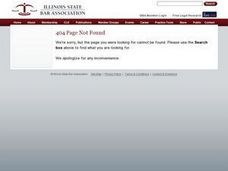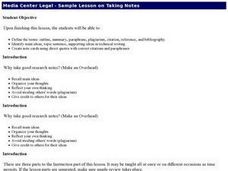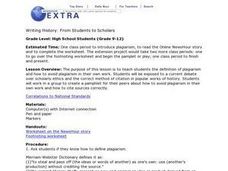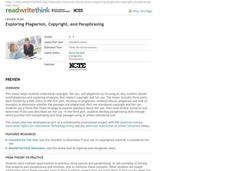Curated OER
What is Plagiarism?
What is plagiarism? Middle schoolers create a class definition of plagiarism and examine the importance of crediting people for their ideas. They review official school policy on plagiarism and study the consequences of presenting the...
California Department of Education
Plagiarism is Stealing!
Stop, thief! Do your pupils understand the consequences of plagiarism? Lesson three of six in a series of college and career readiness activities demonstrates the dangers of taking credit for someone else's work. Learners engage in...
Curated OER
Sample Lesson on Taking Notes
Have your middle schoolers define the terms outline, summary, paraphrase, plagiarism, citation, reference, and bibliography. They identify the main ideas, topic sentence, supporting ideas in technical writing and create note cards using...
Curated OER
Writing History: From Students to Scholars
An Online NewsHour article about scholarly ethics launches this study of plagiarism. Since historians are supposed to bring original ideas and perspectives to their publications, they must give credit to the ideas of others. After a...
ReadWriteThink
Exploring Plagiarism, Copyright, and Paraphrasing
Plagiarism, copyright, and fair use are the focus of a three-part instructional activity designed to inform scholars of how to properly cite others' work. First, pupils use a KWL chart to begin thinking and discussing plagiarism. They...
K20 LEARN
No Imitations, Please! Avoiding Plagiarism
With all the stuff available online, good essays are just a click away. But talk about tracking! Writers beware! New tech can now identify plagiarism, and the consequences of presenting someone else's work as your own are severe. Here's...
Curated OER
Plagiarism: Avoiding Accidental Internet Plagiarism
Demonstrate how to cite information from Internet sources without plagiarizing. If your class is working on an Internet research paper, and you have observed learners cutting and pasting directly from the Internet, the activities and...
Curated OER
Plagiarism
Don't get caught plagiarizing! Before starting your research unit, use this lesson to help your young writers identify plagiarism. The truth is, many kids don't even realize when they're doing it! They practice citing sources when...
Curated OER
Understanding Plagiarism--Worksheet 1
Understanding plagiarism is the goal of this worksheet. After reading the two definitions of plagiarism listed on the sheet, class members decide whether the eight listed scenarios constitute plagiarism. Their responses are used to...
Curated OER
Plagiarism Workshop
What do George Harrison, Vanilla Ice, and Steven Ambrose all have in common? The Warner Brothers’ films Batman Forever and The Devil’s Advocate? All are guilty of plagiarism. And if you are considering a research project and want to...
Curated OER
Plagiarism in the Real World
How would you feel if someone plagiarized your work? After class members turn in an assigned newspaper article, you rewrite the piece using elements of their writing. Then you claim you will be selling the story and that you will profit...
Curated OER
The Original's Sins
Are history textbooks plagiarized? The New York Times article, “Schoolbooks Are Given F’s in Originality,” looks at this question and forms the basis for a lesson on textbooks and plagiarism. The very detailed plan includes resource...
EngageNY
Grade 9 ELA Module 3, Unit 3, Lesson 3
Plagiarism is the theft of intellectual property. To avoid this crime, class members learn how to create a works cited page and how to craft in-text citations. After examining a high-performance model paragraph and an example of a works...
K20 LEARN
Making Sense of MLA: Citing Sources and MLA Formatting
The Modern Language Association (MLA) Style Sheet is about giving credit where credit is due. And while there are different style sheets, the one most often used in Language Arts is the MLA. For this lesson, high school scholars learn...
Curated OER
The War of the Words
“Who’s This Guy Dylan Who’s Borrowing Lines From Henry Timrod?” The basic question in this lesson from the New York Time’s Learning Network is whether artists and authors who use the words of others are stealing from that artist or...
Curated OER
Human Cloning: Is it Biological Plagiarism?
Is cloning good or harmful? Help your class understand the risks and benefits as they read, research, and discuss human cloning. Individuals form teams, research information, and present to the class before concluding with an in-depth...
Curated OER
Cite Your Sites!
The New York Times article “Lessons in Internet Plagiarism,” launches a look at how the Internet has increased the prevalence of plagiarism. The richly detailed lesson includes warm-up and wrap-up activities, discussion questions,...
Curated OER
Credible Sources on the Internet: What to Trust, What to Dismiss and When to Cite a Source
Wait, you mean researchers don't all use Wikipedia? Teach your class about intelligent research with a lesson about evaluating digital sources. The lesson starts with a quickwrite and includes vocabulary exercises and several...
K20 LEARN
Unlocking Answers: Keys to Great Research
Successful searches for information require more than just a device with Google access. Young researchers learn how to use keywords and hashtags, as well as how to evaluate sources and how to paraphrase without plagiarizing in a fun...
Channel Islands Film
Once Upon a Time (Sa Hi Pa Ca): Lesson Plan 3
What was the most significant tool used by the Chumash? How did the environment make the tool possible? What group behaviors allowed the Chumash be be successful for thousands of years? After watching West of the West's documentary Once...
Curated OER
Those Baffling Bibliographies!
Are you working on a research and citation unit? Have your young writers listen to a lecture on how to cite research sources correctly and how to distinguish new information that requires citing. They compile a list of works cited from...
Curated OER
No Plagiarism, Please!
Third graders listen to a lecture on how to take notes and discuss the skills of paraphrasing and correctly citing resources. They prepare note cards according to the format presented in class.
EngageNY
Research: Paraphrasing Relevant Information
Readers take a look at the source Ethical Style: How Is My T-Shirt Made? and discuss how to say the information in the article without plagiarism. Learners make note of and underline sentences that may present a problem in paraphrasing....
Ohio Literacy Resource Center
Arguing with Aristotle Ethos, Pathos, Logos
Introduce your classes to the Art of Rhetoric with a lesson that focuses on Aristotle's persuasive appeals and how they have been used, both ethically and unethically, to influence opinion.

























